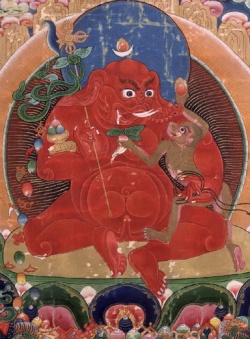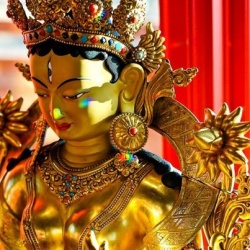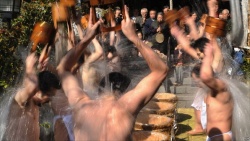Osu
"Osu” in the martial arts does not stand for Ohio State University. "Osu!" s a Japanese word used in many martial arts schools, mostly those associated with a Japanese karate style. In the martial arts, it is used in different ways under many different circumstances. Some karate instructors encourage their Western students to use Osu, while others discourage it. In some schools, the term has taken on an almost mystical status.
"Osu!"is seldom heard in Taekwondo schools, but many Taekwondo instructors have studied a style of karate in the past or may be studying one presently, so they may use it in their schools. There is certainly nothing wrong with using the term in a Taekwondo school, unless you are in a school that frowns on anything that is not strictly Korean. The language, terms, and slang of the country where the school is located is used during class, so why not other terms that serve a useful purpose.
The single word “Osu!” represents the ultimate in what the martial arts have to offer. In schools that use it, one who manifests the spirit of "Osu!" in every word, thought, and action may be regarded as wise, brave, and a true martial artist.
Origins of Osu
Two explanations for the origin of the word "Osu!" have been proposed. The first explanation comes from Dr. Mizutani Osamu, a linguistics professor at the University of Nagoya who is frequently published in The Japan Times, Japan's English language newspaper, as an expert in linguistics. In his book, Japanese: The Spoken Language in Japanese Life, he writes about how people greet each other. He writes that "Osu!" is probably a contraction of the more formal expression "Ohayo gozaimasu," which means, "It is early." The term is commonly used in Japan as a greeting, such as the greeting, "Good morning" is used in America.
Mizutani found that ;"Osu!" is used mostly by men as a rough greeting toward other men, such as the English "Hi ya!", while “Ohayo” is a more familiar and intimate expression used in a casual way toward friends and neighbors. He found “Ohayossu” is a more athletic, male expression used toward a person you do not know well. Mizutani found “Ossu” or “Oosu” to be a very tough, rough expression of masculinity used mainly between people engaged in athletic activities.
Another explanation to the origin of "Osu!" is that it is a contraction of the two kanji symbols used to write the term “Oshi Shinobu” in Japanese:
Thus, "Osu!" means, "to persevere while pushing oneself to the absolute limit.” This strength of character that develops from hard training is known as, “Osu no seishin” (the spirit of Osu). It implies a willingness to push oneself to the limits of endurance, to persevere under any kind of pressure. However, "Osu!" is not just related to the development of extreme physical and mental strength. It also relates to moving beyond ego-centered thoughts of personal gain and loss toward the “way." For this reason, some use the term "moving Zen" to describe martial arts practice.
The use of "Osu!" first appeared in the Officers Academy of the Imperial Japanese Navy, in the early 20th century and later became common with karate students. This helped establish the rough masculine nature of the word.
Different greetings
Men and women's language usage differs more in Japanese than it does in English. There are distinct feminine and masculine expressions, and the Japanese find it inappropriate for women and men to use each other's language.
Ohayo. Ohayo is a more familiar and intimate greeting used casually toward friends, neighbors, or coworkers. Customers would usually use the more formal "Ohayo Gozaimasu" because they are not part of the working in-group.
- Ohayossu or ohayoosu. This is a more athletic, male greeting. You might use this to greet a neighbor you do not know well when you meet him on the street.
- Ossu or oosu. This is very tough, rough masculine greeting used primarily by males engaged in athletic activities. It is generally aimed toward one's colleagues, not toward the coach, instructor, or other seniors. The greeting is usually avoided by women, unless they are involved in an athletic activity in which the women use the word regularly.
- Oh. This is an even rougher greeting than "Osu!" "Oh!" is considered a rougher, manlier, and potentially rude greeting.
Other meanings of “Osu!” as used in the martial arts
It is important to differentiate between the origins of "Osu!" and the current usage of the expression. Just because the word is rooted in meaning "good morning," it does not mean that the Japanese are thinking that when they say it any more than you are thinking the obsolete French expression for "stop" (holla) when you say "hello" to someone.
- Push and Suffer. "Osu!" may express the need for a martial artist to persevere under harsh conditions. This is a military related meaning for it, and since the martial arts are closely related to the military, it is a plausible meaning.
- Push and Hide. "Osu!" may express the need for a martial artist to exert him or herself and do not show it. Oriental cultures do not think it is appropriate to allow your face to display all of your emotions. In oriental martial art classes, the students are expressionless, even when training intensely.
- Please sir (ma’am), may I have another! "Osu!" may also be used by martial artists as a contraction of the world “Onegaishimasu,” a polite catchall word that generally means "please" and sometimes "sorry."
Ways "Osu!" may be used during martial art training
- When you enter or leave the dojo, bow and say "Osu!".
- In “Zen, Pen, and Sword,” Randall G. Hassle explains that "Osu!" may be used as a strong affirmative reply even if full understanding is not yet present. For example, if your bad knee acts up during a kicking drill, and the instructor asks, "Are you okay?” you might reply, "Osu!". This indicates that you realize there is nothing you or anyone else can do to make the situation any better or less painful at the moment, and you are willing to continue training without knowing if your actions will lead to further injury to the knee.
- When you greet a fellow student, you say, "Osu!" instead of "hello."
- When you respond to an instruction or question in class, you say, "Osu!" instead of "yes."
- During class, when the instructor notices that you seem weak and asks, "Are you okay?” you respond by saying, "Osu!!" indicating that, even though you do not feel 100 percent, you are ready and willing to give everything you have to give.
- "Osu!’’ is used to build “Esprits de Corps” in a school. Esprits de Corps is the feeling you get from knowing you are part of a good team. There are other words, both in the military and elsewhere, that are used for the same purpose. Marines yell "Ooorrah”. The Army yells, "Hooah!" ESPN commentators yell, "Booyah!" when someone scores a goal. Some Americans yell, "Yee-haw!" while Americans in the South use the Rebel Yell "Woooo!!!"
- When performing techniques in class, each technique is often accompanied by a loud "Osu!"
- When training, you get tired. When you have pushed yourself to your limit, your body wants to stop, but you use your mind to keep pushing the body. Then your mind wants to stop. You endure the pain, yell, "Osu!” and your warrior spirit takes over and helps you persevere.
- When free-fighting in class and your opponent lands a good, hard technique, you say, "Osu!" to acknowledge your opponent's skill.
- When performing basic techniques over and over during class, it is easy to become frustrated, especially when your progress seems slow. When this occurs, you say, "Osu!" and rededicate yourself to the training.
- As a measure of respect, fighters at a tournament bow and say "Osu!" to the front, to the referee, and to each other, before and after the fight.
How to pronounce "Osu!" properly
Most Westerners pronounce "Osu!" somewhat incorrectly. "Osu!" is a word that uses all of the most difficult pronunciation features of the Japanese language. When you say it, to the Japanese ear, they probably hear you say "usu," which means "mill-stone."
- Oosssss! This is how most Westerners say it, as if it rhymes with "book" and ends with a hiss. The word does not actually rhyme with book. There is an "oo" sound in the Japanese language that could be used to reproduce that sound, but it is not used here.
- Ossu! Japanese also has long consonants. That means that you can make a “k” into a ”kk,” and the meaning of the word changes. The “s” in "Osu!" may be stretched out a little, but not a lot as in “sssss,” which makes a hissing noise.
- Oosu! The Japanese have the ability to stretch out a vowel. This means that they speak the vowel sound for two beats instead of one, thus "osu" can be said as, "o-osu." This is difficult for English speakers to learn because our idea of long vowels is that they change pronunciation. Japanese long vowels are just spoken longer. Since English has no "beat" the way Japanese does, it takes some practice to learn this. Some Japanese say, "oosu," which still does not rhyme with book, but is a stretched out “o” noise, almost a diphthong as with the English “o.”
- Japanese does not have a diphthong “o.” A diphthong is a vowel sound that is actually comprised of two sounds put together in an extended and changing sound. To Japanese, the English “o,” as in “most,” sounds like “m-oh-u-st.” In English, we stretch out the length of the sound and slowly close our lips from the “o” shape to the “u” shape as we say the word. Japanese do not close their lips as they pronounce “o,” so they only say the first half of the English “o.” If you use the diphthong, Japanese are not confused by the pronunciation; they hear you accidentally pronounce it correctly.
- The “u” at the end of the “Osu!” is silent, so you do not have to pronounce it, even though the Japanese actually do always pronounce it. However, they only pronounce it for a quarter beat.
- Oh-ss! This is the correct pronunciation. To properly pronounce the “o” in “Osu!”, you have to imitate Japanese. Instead of "Ooosss!", say, "Oh-ss." It rhymes with boat, coast, toast, or most.
Avoid being offensive when using Osu
Since "Osu!" is considered a rough, masculine expression in Japanese, it may offend certain Japanese, so when you use it with Japanese, be very careful to follow the appropriate usage.
- Man to Man. "Osu!" is a masculine word usually only spoken by men. The word is rough and associated with all athletic activities, not just the martial arts. Women rarely use the word except maybe in karate classes. Women in Japan have specific speech, and when men address them, to be polite, they tend to use a gentler style in their speech. When men use "Osu!", it is generally not directed at women.
- Your own age group. Except during athletic activities, "Osu!" is generally only spoken toward people within the speaker's own age group. As a non-polite expression, using it toward your friends is also appropriate.
- Your in-group. The Japanese are very sensitive to in-groups and out-groups. Polite speech is always used outward away from your in-group and plain speech is used toward your in-group. So, when you use "Osu!" toward a man your age at a karate class, you are indicating that the two of you are friends outside of class.
- As a greeting. "Osu!" is primarily a greeting. You use it toward other people, not toward an empty room when you bow onto the mat or before you perform a kata. You cannot really use it for "goodbye." It is never a question, and does not mean, "I understand."







